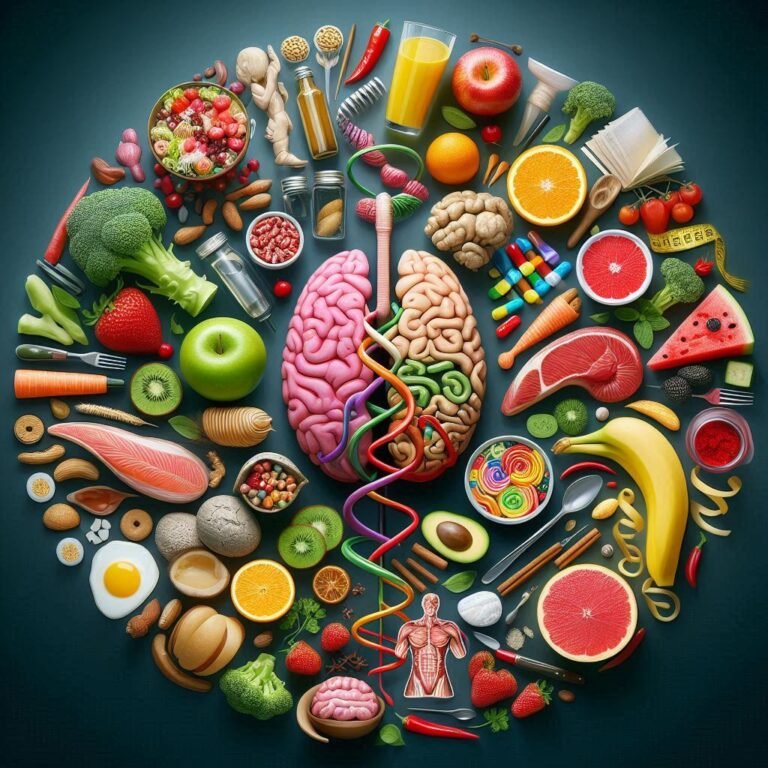The Essential Role of Nutrition in Overall Health
Nutrition plays a vital role in maintaining and improving overall health, serving as the foundation upon which the body functions. Essential nutrients, categorized into carbohydrates, proteins, fats, vitamins, and minerals, contribute significantly to various bodily functions. Carbohydrates provide the primary source of energy, fueling cells, tissues, and organs. Proteins are crucial for building and repairing tissues, producing hormones, and supporting immune function. Healthy fats are essential for brain development and nutrient absorption, while vitamins and minerals play significant roles in metabolic processes and cellular function.
A balanced diet, rich in these essential nutrients, not only enhances physical health but also positively influences mental well-being. Research has indicated that an adequate intake of vital nutrients is associated with reduced symptoms of anxiety and depression. For instance, foods rich in omega-3 fatty acids, such as fish and walnuts, have been shown to support cognitive function. Similarly, complex carbohydrates from whole grains can stabilize blood sugar levels, promoting better mood and focus.
The link between nutrition and disease prevention is equally compelling. Numerous studies demonstrate that diets high in fruits, vegetables, whole grains, and lean proteins can lower the risk of chronic illnesses, such as heart disease, diabetes, and obesity. For example, the Mediterranean diet has been associated with improved cardiovascular health, thanks to its emphasis on healthy fats, antioxidants, and fiber. Conversely, poor nutrition, characterized by the excessive consumption of processed foods and sugars, has been linked to a variety of health issues, underscoring the importance of making informed dietary choices.
Expert opinions reinforce the necessity of prioritizing nutrition as a fundamental aspect of health. Nutritionists and healthcare professionals consistently advocate for a well-rounded diet to foster longevity and vitality. By understanding the essential role of nutrition, individuals can make significant strides in enhancing their health and overall quality of life.
Practical Tips for Implementing Healthy Eating Habits
Adopting healthy eating habits is a crucial step towards improved overall health and well-being. To facilitate this transition, effective meal planning can play a significant role. Begin by designating a specific day each week to plan your meals. This allows for structured shopping lists and minimizes impulsive food purchases. When planning meals, aim to include a variety of food groups while emphasizing whole foods—fruits, vegetables, whole grains, lean proteins, and healthy fats. Incorporating these foods provides essential nutrients that bolster your health.
Another important aspect of healthy eating is becoming proficient at reading nutritional labels. Familiarize yourself with key indicators, such as serving sizes, calories, and macronutrients. Look for items with lower added sugars and sodium, and prioritize products with higher fiber content. Understanding these labels enables better decision-making when selecting packaged foods, facilitating a diet that aligns with health goals.
Portion control is another vital principle in maintaining a balanced diet. Using smaller plates can help manage portion sizes, making it easier to avoid overeating. Additionally, being mindful while eating—taking the time to chew food thoroughly and savor each bite—can enhance satisfaction and reduce the likelihood of excessive consumption.
Preparing simple, nutritious recipes at home fosters a healthy eating environment. Easy-to-make meals such as quinoa salads or vegetable stir-fries not only maximize nutrient intake but also minimize dependence on processed foods. Healthy snacks, such as fruit, nuts, or yogurt, can also stave off cravings between meals.
Finally, be prepared to face challenges when implementing these healthy practices. Cravings and dining out can disrupt progress. To counteract cravings, ensure that you stay hydrated and incorporate a variety of flavors into your meals, which can satisfy your palate while adhering to your dietary goals. When eating out, consider healthier options like salads or grilled proteins instead of fried foods. Adopting these strategies helps cultivate sustainable, healthy eating habits that can significantly improve your nutrition and health.



